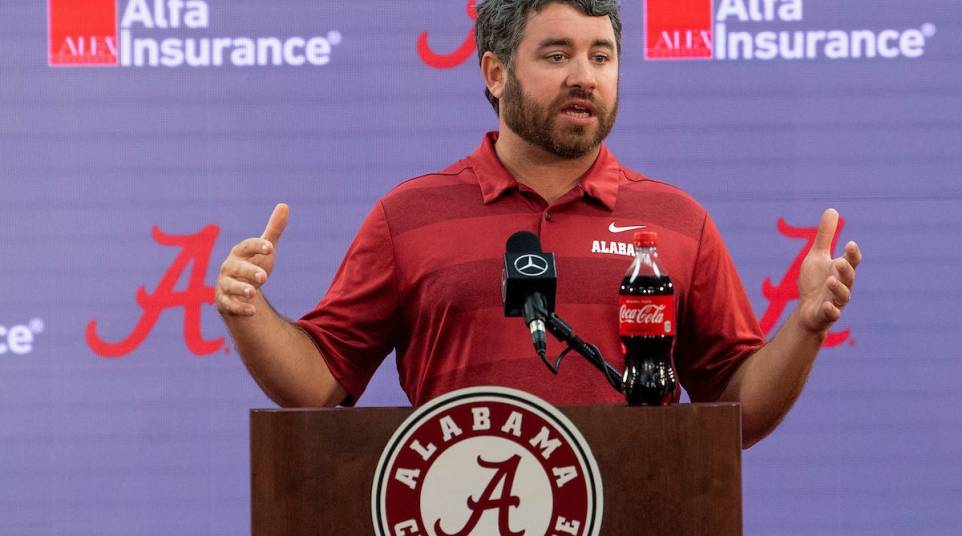
Hayes: How Kentucky, Alabama handled DUI arrests shows need for SEC to step in, once and for all
Two DUI arrest, two different responses. And the SEC is suddenly dealing with an optics problem.
Kentucky announced Monday that it had suspended All-SEC running back Chris Rodriguez for the season-opener, and coach Mark Stoops intimated that Rodriguez could be among a number of players who will receive multiple-game suspensions.
Rodriguez was arrested this offseason and charged with driving under the influence.
Alabama defensive coordinator Pete Golding also was arrested this offseason and charged with driving under the influence.
Alabama hasn’t publicly announced discipline for Golding, further highlighting the SEC’s (and college football’s) need for a uniform policy for players and coaches when dealing with driving under the influence.
When asked Monday if Golding had been disciplined by the university, Alabama spokesman Josh Maxson said, “I don’t know the answer to that question.”
Alabama athletic director Greg Byrne did not respond to a request for comment.
“DUI charges are subject to law enforcement activity, judicial decision making and campus level accountability,” SEC commissioner Greg Sankey said. “There has not been conversation (within the conference) related to creating conference level DUI related policy.”
This moment — this specific and glaring difference between player and coach — is the perfect time for the SEC to lead.
In the now booming age of player rights, it’s time for the SEC — the most successful conference in college sports with the most powerful commissioner in college sports — to create a conference-wide policy and change the disparity of discipline.
One member institution can’t decide to suspend a player for driving under the influence, while another institution ignores it with a coach — or doesn’t publicly announce any discipline measure.
It’s terrible optics, and frankly, the SEC is better than this. Everyone makes mistakes, everyone deserves second chances. That’s not the point.
With the heightened awareness on campus communities to eliminate drinking and driving, there can be no mixed signals from the SEC university presidents. There can’t be rules for thee, but not for me.
With ride shares available all over campuses, as well as public transportation, if you’re driving while intoxicated, you’re doing it on purpose — not because there’s no other option.
If players are seen as role models, coaches — the well-paid adults in the room — must be held to a similar if not higher level of accountability.
“There are consequences for making bad decisions,” Golding said in early August during media access previewing the 2022 season. “And I made a very poor decision that affected a lot of other people than myself. And it was selfish. And I was wrong, and I’ve got to suffer the consequences for it.”
So far, the only consequences for Golding has been public embarrassment and a mugshot.
The SEC has one uniform discipline bylaw, and it’s strictly for players — not coaches. Bylaw 14.1.18 states “a prospective student-athlete … who has been convicted of or pled guilty or no contest to a felony involving serious misconduct … shall not be eligible for athletically-related financial aid, practice or competition at an SEC member institution.”
A first-time DUI is not a felony in Kentucky or Alabama, as long as it doesn’t cause serious bodily injury or death.
But why hide behind the level of charge? Driving under the influence, while not a felony, isn’t unique to those arrested. Driving while intoxicated is a danger to others.
Sankey and the SEC presidents have accomplished great things in building the strongest brand in college sports. The conference wins national championships and develops more — by a long way — NFL Draft selections.
APR ratings have increased across the board, and the latest media rights deal will change the conference and college football in ways few could imagine.
The last thing the SEC needs is an optics problem with the discipline of players vs. coaches — especially with such a hot-button issue like driving under the influence.
In March of 2021, Golding signed a contract extension at Alabama through the 2024 season, and his salary will increase each season through the length of the deal. He made $1.5 million in 2021 and will make $1.73 million this season.
Rodriguez is a 2-time All-SEC selection and needs 1,134 yards this season to become Kentucky’s all-time leading rusher. He has been a critical piece to Stoops’ build-out of the UK program.
These are two important men in the SEC, on two teams that will be among the elite of the league.
Now is the time for Sankey and the SEC presidents to take a stand and declare a conference-wide policy on disciplining those arrested for driving under the influence.
And end the status quo of rules for thee, but not for me.
